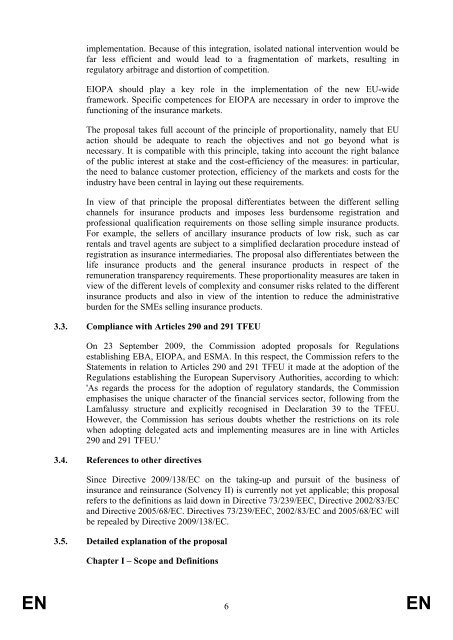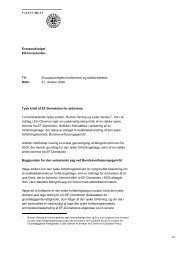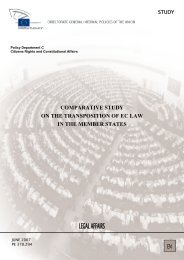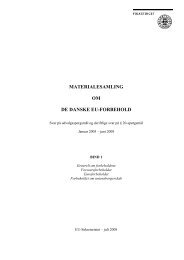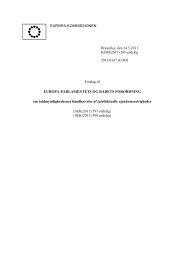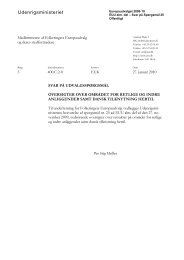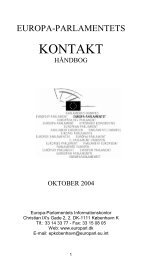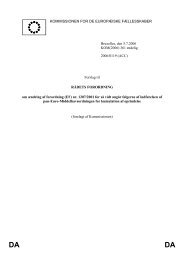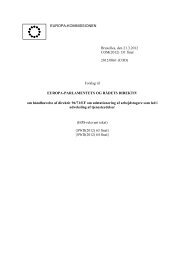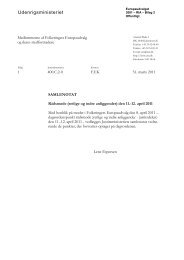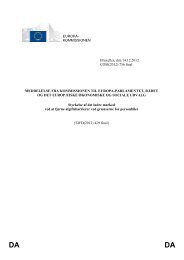EUROPEAN COMMISSION Brussels, XXX COM(2012) 360 ... - BVVM
EUROPEAN COMMISSION Brussels, XXX COM(2012) 360 ... - BVVM
EUROPEAN COMMISSION Brussels, XXX COM(2012) 360 ... - BVVM
You also want an ePaper? Increase the reach of your titles
YUMPU automatically turns print PDFs into web optimized ePapers that Google loves.
implementation. Because of this integration, isolated national intervention would be<br />
far less efficient and would lead to a fragmentation of markets, resulting in<br />
regulatory arbitrage and distortion of competition.<br />
EIOPA should play a key role in the implementation of the new EU-wide<br />
framework. Specific competences for EIOPA are necessary in order to improve the<br />
functioning of the insurance markets.<br />
The proposal takes full account of the principle of proportionality, namely that EU<br />
action should be adequate to reach the objectives and not go beyond what is<br />
necessary. It is compatible with this principle, taking into account the right balance<br />
of the public interest at stake and the cost-efficiency of the measures: in particular,<br />
the need to balance customer protection, efficiency of the markets and costs for the<br />
industry have been central in laying out these requirements.<br />
In view of that principle the proposal differentiates between the different selling<br />
channels for insurance products and imposes less burdensome registration and<br />
professional qualification requirements on those selling simple insurance products.<br />
For example, the sellers of ancillary insurance products of low risk, such as car<br />
rentals and travel agents are subject to a simplified declaration procedure instead of<br />
registration as insurance intermediaries. The proposal also differentiates between the<br />
life insurance products and the general insurance products in respect of the<br />
remuneration transparency requirements. These proportionality measures are taken in<br />
view of the different levels of complexity and consumer risks related to the different<br />
insurance products and also in view of the intention to reduce the administrative<br />
burden for the SMEs selling insurance products.<br />
3.3. Compliance with Articles 290 and 291 TFEU<br />
On 23 September 2009, the Commission adopted proposals for Regulations<br />
establishing EBA, EIOPA, and ESMA. In this respect, the Commission refers to the<br />
Statements in relation to Articles 290 and 291 TFEU it made at the adoption of the<br />
Regulations establishing the European Supervisory Authorities, according to which:<br />
'As regards the process for the adoption of regulatory standards, the Commission<br />
emphasises the unique character of the financial services sector, following from the<br />
Lamfalussy structure and explicitly recognised in Declaration 39 to the TFEU.<br />
However, the Commission has serious doubts whether the restrictions on its role<br />
when adopting delegated acts and implementing measures are in line with Articles<br />
290 and 291 TFEU.'<br />
3.4. References to other directives<br />
Since Directive 2009/138/EC on the taking-up and pursuit of the business of<br />
insurance and reinsurance (Solvency II) is currently not yet applicable; this proposal<br />
refers to the definitions as laid down in Directive 73/239/EEC, Directive 2002/83/EC<br />
and Directive 2005/68/EC. Directives 73/239/EEC, 2002/83/EC and 2005/68/EC will<br />
be repealed by Directive 2009/138/EC.<br />
3.5. Detailed explanation of the proposal<br />
Chapter I – Scope and Definitions<br />
EN 6 EN


